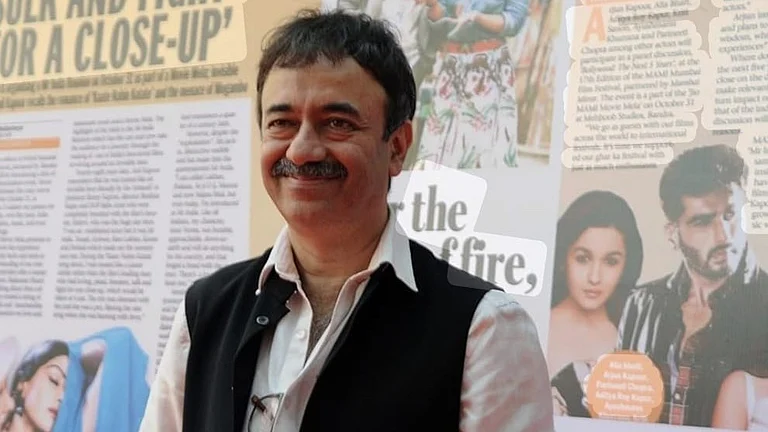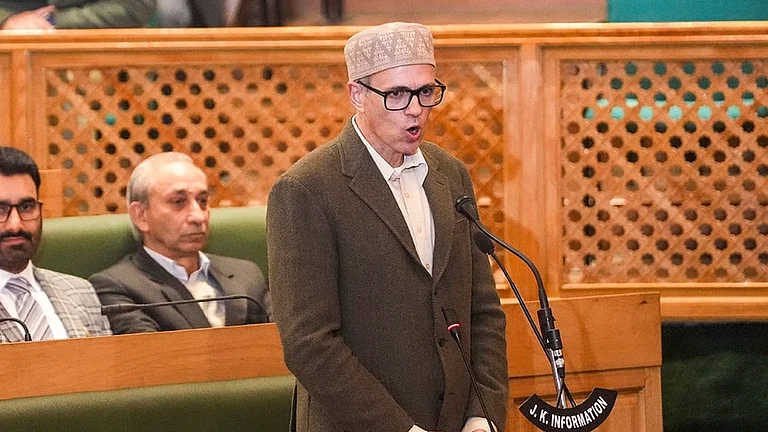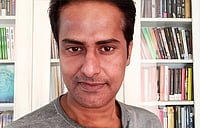Is P.V. Narasimha Rao a writer first and a politician second?
I continue to be a politician. I am an ordinary individual who wanted to communicate something about the country and the political process to readers. I'm a small man from a small village, although I have lived in the city for so many years now. But my soul is in the village. Of course, in my state my poetry and other writings are well known. I began with writing in Telugu. It was an urge for self-expression. But because I am a politician naturally I have based this book on a political subject, with some of my own experiences.
How did the book emerge?
I had written a paper dealing with the same subject for a talk at London University entitled The Chief Minister's Burden. This is a fictionalised elaboration of that paper, but I have added many things to make it more readable. Also, the book was not written in one day, it has been following me around at a distance, but not like a diary or an autobiography.
You seem disillusioned by the current state of your party and the role of The Family.
What family? I have no feelings for any family. I am from a small village in Andhra Pradesh. Why should I talk about any family? If I had not won elections, I would have been just a sarpanch somewhere. Are thousands of Congress workers servants? After all, what if Shastri had been prime minister for 10 years, what would you have said of family? Today, Farooq Abdullah's son contests elections and you say family, family. Does the son of a lawyer not inherit his father's legal practice? Does he not do well if he has the aptitude? I think there is something wrong with our urban ways of thinking, the way we keep going on about family, family.
But you lament that Nehru had no successor....
Nehru had the intellectual pre-eminence to actually create a relationship between India and the world that was new. He based this relationship not on wealth but on the strength of an ancient civilisation. Many others did not have this intellectual capacity.
Did Indira Gandhi have trouble living up to her father's greatness?
Nobody has bothered to find out why she wanted more power for herself. Why within a short time after the achievement of Pokharan did she have to promulgate the Emergency? Some people said she was paranoid and had an inferiority complex, but nobody has adequately explained her personality. I intend to try that topic in the next volume. I am holding intensive discussions with the people who were involved in events at that time.
The book is an examination of several political and social themes: the autocracy of the Hindu family, the continuing grip of feudalism, corrupt politics, the limits of legislation. Was writing it like a catharsis?
So much of our democracy is based on received wisdom. We have tried to make the democratic model ours, but we have to intensify this process. Democracy has its own version in India, people have to put their heads together and try and find out what it is. My book tries to bring out how many dozens of reforms, land reforms particularly, are needed. In administration, or outside, it is difficult to do good because there are so many vested interests. Jeevan sangram hain. In democracy, the ultimate weapon is legislation, but so many laws are dead letters. Anti-dowry acts are unable to stop dowry. There are other laws that are unimplementable and unimplemented. Is this the kind of legislation that can bring about real social change?
In politics today we see short-cuts to being elected. Casteism is a short cut, communalism is a short cut. Today, forget about the party worker being bribed, even the voter is corrupted. Society has never been as centrifugal as it is today. It is totally scattered.
In many ways the Indian identity has been one by which we have grafted something—the British model of governance—onto our society. Yet the two must now be linked. The Indian identity must be meshed with modern administrative systems without violent changes to Indian systems. There must be a necessary interaction between the two.
Did you try to reflect popular cynicism with politics?
Everyone criticises politicians. I wanted to write something for political workers and general readers. If I am proved wrong then I will be only too happy to accept it. If, however, I am right, then someone will have to do something. In spite of all kinds of questionable methods, the country is going ahead. But people see only the minus points. If the system is bad, we must change it. After 50 years there are only tentative conclusions. People blame politicians and politicians engage in politics. It's a vicious cycle, in which the people and their leaders are trapped.
Do you see yourself as a sort of philosopher-king?
If we want wisdom we must go to the people. The selfishness of certain individuals is making the people behave in a particular way, but there is an innate common sense—the rita which is ingrained in the thinking of the people. The concept of Absolute Good or wanting to be the Absolute Good. When they are not good there is remorse, of not being able to do the right thing, but there is a constant awareness of what is right. I have lived among the people, I know them. They cannot always resist evil, they don't have adequate strength. So we have to organise the good in society, make it a strong force.
Why did you change some of the provocative parts from the first draft of the book?
I must thank your magazine for showing me what to leave out.When I saw what you excerpted, I realised that the general reader too would concentrate only on those bits and my efforts would be wasted. You understand mahakavya. The book reflects a wide spectrum of life. It contains many phases, several sentiments which we call rasas. But you highlighted only one rasa and it was not the sole representative of the work. It was not intended to be so. My motivation was not in pandering to mass instincts. I'm not interested in becoming that sort of a writer. Nothing else has changed, there are only some changes in sequence.
Are the characters based on real people?
No, and I intend to say this in my speech, they are synthetic characters. I have taken a trait or two from a combination of living people. But what is the point in saying that this is so-and-so and this is so-and-so. I am trying to represent an entity. When I speak of a chief minister, I am examining the powers he has and what he does and how he operates. The person is a representation of an entity.
You must be one of the few novelist-politicians we have.
The question is, why did I come into public life in the first place? Was it like a last resort for scoundrels? Or was it like a hostage? I was virtually thrown into politics. When I joined, my friends said I had joined "in the name of the dreamers". Nobody expected me to succeed. After all, I don't come from a big family, I don't have a big name behind me. In that sense I am not the typical politician. You could say that I've always been literary and academic.
You're looking a bit grim.
Yes, I have a difficulty with grimness. There are some people who can smile easily. They keep smiling for no reason. I can't do that. I can't smile unless there is a reason to smile.


























